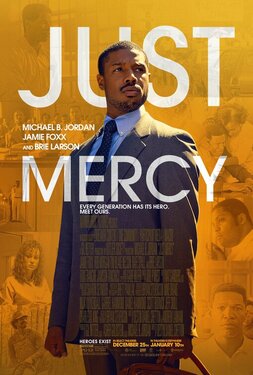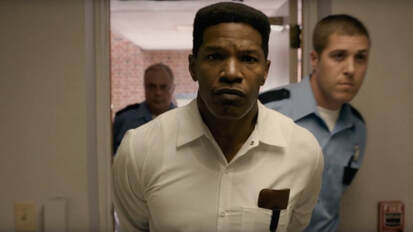
“I've learned that each of us is more than the worst thing that we've ever
done; that the opposite of poverty isn't wealth, the opposite of poverty is
justice; that the character of our nation isn't reflected on how we treat the
rich and the privileged, but how we treat the poor, the disfavoured,
and condemned.”
In January, an article from The Gospel Coalition recommended
that Christians should sit up and take notice of three films, as a result
of “their moral clarity and courage”: Just Mercy, Dark Waters and A
Hidden Life. Much to my shame as a so-called ‘film fan’, I ignored all of
them, making the excuse that they were ‘too serious’ to watch in such
a dour time as this. That is, until now, as I recently felt prompted to
watch and engage with Just Mercy (based on a true story), which is
powered and propelled forward by its righteous anger in the face of
pure evil, which is, tragically, all too prominent in today’s society:
systemic inequality which derives from racism. It’s for this reason that
the film naturally possesses serious emotional heft, moving me to tears as
it neared its conclusion. In highlighting and speaking out against evil, therefore, Just Mercy is essential viewing. However, it’s the distinctly Christian response to the subject of mercy, deeply engrained within the film’s DNA, which is certainly worth exploring for evangelistic purposes.
For example, through establishing early on that Bryan is a Harvard law graduate and has specifically chosen not to pursue a career in a prestigious law firm, but establish the non-profit Equal Justice Initiative, Bryan is noted to be fixated upon the plight of the needy and not those of greater social standing, or his own personal gain. Like Jesus, Bryan is compassionate, which prompts Him to act with merciful love and do his utmost to rescue these broken individuals. In every situation, Bryan grants such tender mercies to whoever needs it – of which there are many. Even when we first meet Bryan, director Destin Daniel Cretton donates an entire scene to watching him reminisce with a prison inmate who, much like him, grew up going to church. And for albeit a brief moment, this emotionally tortured inmate’s emotional burdens are lifted from him and he experiences joy. Many oppressed individuals cry out to be saved throughout Just Mercy and are almost always met at their greatest need by the ever-present Bryan, which reminded me of Matthew 20, when two blind men hear that Jesus is coming by and call out to Him:
“Sir,” they answered, “we want you to give us our sight!” Jesus had pity on them and touched their eyes;
at once they were able to see, and they followed him.
Matthew 20:30-34 (GNT)
Challenge:
Why not prayerfully invite a friend or family member who doesn’t yet know Jesus, to watch Just Mercy for themselves? Use the film’s themes to ask them what they thought of the film, if they spotted any links to Christianity and what they might think of the Gospel’s response to this subject.
If you feel able to, ask them what they think about God fighting for us and not being content with us perishing in our sin? What do they think about God wanting to grant them mercy, despite having done wrong against Him? You could then ask them what they think about how God loves them so much, that He still considers them valuable despite the way in which they’ve lived their life, in ignorance of Him. Later, if they're open to hearing it, take an opportunity to share the hope of the Gospel message with them.
Prior to watching the film for yourself, however, take a moment to pray that God would speak to you through the film. If you feel comfortable, pray this prayer over all of your future, film-watching experiences:
Dear Lord, As I watch this film, I ask that you would be present here with me. Highlight to me anything within it that is honourable, anything that can be used in conversation for your Kingdom purposes. Amen.
Just Mercy is now available to purchase on DVD/Blu-Ray or rent on digital platforms


 RSS Feed
RSS Feed